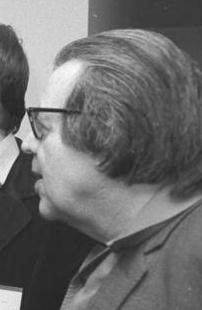Erich Fried facts for kids
Erich Fried (born May 6, 1921 – died November 22, 1988) was a poet, writer, and translator from Austria. He became well-known in Germany and Austria for his political poetry, which talked about important world issues. Later, he also became famous for his love poems. As a writer, he created plays and short novels. He was also a talented translator, changing books by English writers, especially William Shakespeare, into German.
Erich Fried was born in Vienna, Austria. However, he had to leave his home and move to England in 1938 after Nazi Germany took over Austria. He settled in London and became a British citizen in 1949. He made his first official visit back to Vienna in 1962.
His Life Story
Erich Fried was born in Vienna to Jewish parents, Nelly and Hugo Fried. From a young age, he was very interested in writing political essays and poems. He had to flee to London after his father was killed by the Gestapo, a secret police force, during the time Austria was taken over by Nazi Germany.
During World War II, Erich worked different jobs, like a librarian and a factory worker. He also helped his mother and many other Jewish people leave Nazi-controlled Austria and come to the UK. He joined a youth group called Young Austria, which had left-wing ideas. But he left the group in 1943 because he disagreed with its growing Stalinist views. In 1944, he married Maria Marburg, and they had a son named Hans. That same year, his first book of poems was published. He and Maria separated in 1946.
In 1951, Erich Fried's German translation of Masefield's Good Friday was played on the BBC German Service radio. He divorced Maria in 1952. That same year, he married Nan Spence Eichner. They had two children together: David (born 1958) and Katherine (born 1961). From 1952 to 1968, he worked as a political reporter for the BBC German Service. He translated works by famous writers like Shakespeare, T. S. Eliot, and Dylan Thomas. In 1962, he visited Vienna for the first time since leaving. Erich and Nan divorced in 1965. In 1965, he married for a third time to Catherine Boswell. They had three children: Petra (born 1965), Klaus, and Thomas (born 1969).
Erich Fried published many books of poetry, as well as radio plays and a novel. His work sometimes caused debate, especially when he wrote about issues like the Zionist movement or supported different political causes. Most of his work was published in Western countries. However, in 1969, some of his poems were published in East Germany. In 1974, his translations of Dylan Thomas were also published there. The composer Hans Werner Henze used two of Fried's poems in his song collection called Voices (1973).
In 1982, Erich Fried became an Austrian citizen again, but he also kept his British citizenship. He passed away from intestinal cancer in Baden-Baden, West Germany, in 1988. He is buried in Kensal Green Cemetery in London.
An Austrian literary prize is named in his honor, called the Erich Fried Prize.
His Books and Poems
Here are some of the books and poetry collections Erich Fried wrote:
- Drei Gebete aus London (Three Prayers from London), 1945
- Ein Soldat und ein Mädchen (A Soldier and a Girl), 1960
- Reich der Steine, 1963
- Warngedichte (Warning Poems), 1964
- Überlegungen, 1964
- Kinder und Narren, 1965
- und Vietnam und (and Vietnam and), 1966
- Anfechtungen, 1967
- Die Beine der größeren Lügen, 1969
- Poesiealbum, 1969
- Unter Nebenfeinden, 1970
- Die Freiheit den Mund aufzumachen, 1972
- Höre Israel, 1974
- So kam ich unter die Deutschen, 1977
- 100 Gedichte ohne Vaterland, 1978
- Liebesgedichte (Love Poems), 1979
- Es ist was es ist (It is what it is), 1983
- Um Klarheit, 1985
- Mitunter sogar Lachen, 1986
His Works Translated into English
Some of Erich Fried's works have been translated into English for readers who don't speak German:
- Arden Must Die: An Opera on the Death of the Wealthy Arden of Faversham. (Original title: Arden muss sterben). Translated by Geoffrey Skelton. London: Schott 1967; New York: Associated Music Publishers 1967
- Last Honours. A selection of poems translated by Georg Rapp. London: Turret 1968
- On Pain of Seeing. A selection of poems translated by Georg Rapp. London: Rapp and Whiting 1969; Chicago: Swallow Press 1969
- 100 Poems Without a Country (similar to the original 100 Gedichte ohne Vaterland). Translated by Stuart Hood and Georg Rapp. London: John Calder 1978; New York: Red Dust 1980
- Love Poems. Bilingual edition. A selection of poems from Liebesgedichte (1979) and Es ist was es ist (1983), translated by Stuart Hood. London: Calder Publication Limited Riverrun Press 1991. New, revised edition Alma Classics Ltd, 2011
- Children and Fools. A selection of 34 stories translated by Martin Chalmers. London: Serpent's Tail 1993
You can also find translations of single poems in different collections of poetry.
See also
 In Spanish: Erich Fried para niños
In Spanish: Erich Fried para niños
 | George Robert Carruthers |
 | Patricia Bath |
 | Jan Ernst Matzeliger |
 | Alexander Miles |


